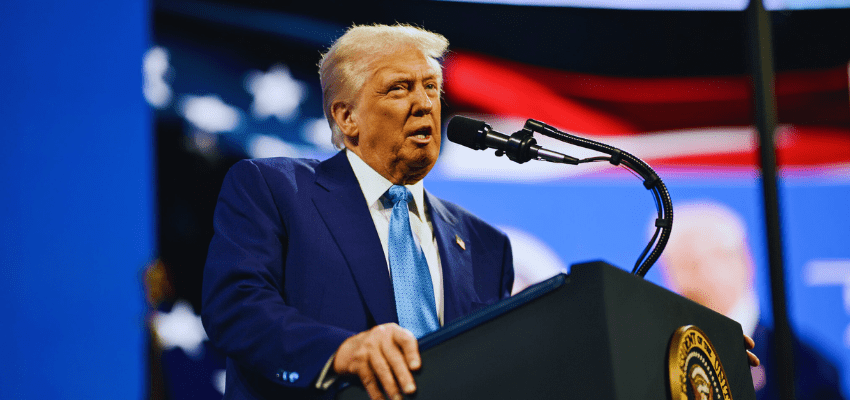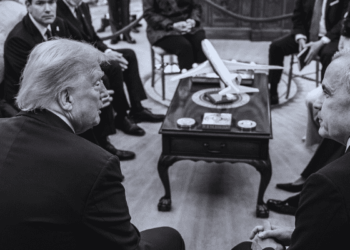This article originally appeared in WGI.World.
By Stephen Nagy, August 26, 2025
The imposition of tariffs by the Trump administration on both Canadian and Indian exports presents the governments in Ottawa and New Delhi with a fundamental test of their diplomatic maturity, strategic patience and long-term vision for their foreign policy, one that is firmly imbedded in the realities of the tyranny and benefits of geography, structural changes in our international order, and the tough but very real challenges of a return to Machiavellian politics.
In this context, while the transactional nature of “America First” policies and the unpredictability of President Trump’s approach understandably generate frustration and concern in Ottawa and New Delhi, responses must be guided by cold strategic calculation rather than emotional reaction. The instinct to retaliate, to seek dramatic alternatives, or to indulge in public confrontation may satisfy domestic audiences temporarily, but such approaches risk compromising each nation’s long-term security and prosperity.
This essay examines how three cardinal sins of diplomacy including binary thinking, emotional decision-making, and excessive pride threaten to derail rational policy responses to US trade pressure. Both Canada and India face the temptation to frame their choices in stark either/or terms, to let anger drive policy, and to prioritize national pride over national interests. These impulses, while understandable, must be resisted.
The Cardinal Sins of Modern Diplomacy
Binary thinking reduces complex international relationships to simplistic choices such as ally or adversary, cooperation or confrontation, submission or resistance. This framework ignores the nuanced reality of international relations where nations simultaneously compete and cooperate across multiple domains. In responding to US tariffs, binary thinking manifests as the false choice between “capitulation” to President Trump’s demands or seeking wholesale alternatives to the US relationship.
Emotional decision-making allows immediate frustration to override long-term strategic thinking. When leaders react to provocations with anger, implement policies driven by domestic political pressures for “standing up” to Washington, or make decisions based on personal slights, they risk sacrificing enduring national interests for temporary satisfaction.
Pride, while important for national morale, becomes destructive when it prevents pragmatic accommodation. The need to “save face” or demonstrate toughness can lead to escalatory spirals that damage both parties while achieving nothing substantive. In trade disputes, pride-driven policies often hurt domestic constituencies more than they influence the target nation.
Canada’s Strategic Imperative is to Work within Reality
For Canada, the geographic, economic, and security realities are inescapable. With 77% of exports destined for the US and supply chains so integrated that components cross the border multiple times during production, Canada cannot afford the luxury of emotional responses. The NORAD partnership, Five Eyes intelligence sharing, and countless bilateral mechanisms create a web of interdependence that no amount of diversification can meaningfully alter, unless Canada chooses to fundamentally redefine its relationship with the US and associated partners.
The binary trap for Canada lies in viewing the choice as either meek acceptance of US terms or defiant pursuit of alternative markets. This ignores Canada’s most effective tool, sophisticated engagement within the existing bilateral framework. Canadian leaders must recognize that influence in Washington comes not through public confrontation but through patient cultivation of allies within the US system.
Provincial premiers should intensify engagement with governors whose states depend on Canadian energy, materials, and markets. Canadian businesses must mobilize their US partners, suppliers, and customers to advocate within the American political system. The message should emphasize mutual benefits including Canadian energy security contributions, defense burden-sharing through NORAD, and the job-creating effects of integrated supply chains.
Emotional responses, whether angry denunciations of Trump’s tactics or prideful assertions of Canadian independence only provide ammunition for those in Washington who view allies as free-riders. Instead, Canadian officials must maintain disciplined messaging that acknowledges American concerns while demonstrating concrete value. This means avoiding the temptation to score domestic political points through anti-Trump rhetoric, no matter how satisfying it might feel.
The Trudeau government and many of its top representatives did this publicly, poisoning relations with the image-conscious and vindictive Trump administration before he was re-elected.
The pride trap manifests when Canadian leaders feel compelled to demonstrate they won’t be “pushed around.” But strategic patience is not a weakness. Canada’s response should focus on tangible deliverables such as increasing defense spending to approach NATO targets, enhancing border security cooperation, and highlighting Canada’s role as a reliable energy supplier in an unstable world.
India’s Strategic Calculus and the China Factor
India faces an even more complex challenge. Unlike Canada, India has legitimate alternatives to US markets and less economic dependence. However, India’s security challenges, particularly the growing threat from China and persistent terrorism emanating from Pakistan make a US partnership irreplaceable. No combination of relationships with Russia, Europe, or other powers can provide the strategic counterweight to China that partnership with the United States offers.
The binary trap for India involves viewing engagement with Washington as choosing sides in great power competition and returning to India’s humiliating colonial past. This framing ignores India’s successful history of strategic autonomy and multi-alignment. India can deepen security cooperation with Washington while maintaining economic ties with China. Traditional relationships with Putin’s Russia as he continues his war on Ukraine may be more difficult however the key is avoiding the false choice between absolute alignment and prideful isolation.
Emotional decision-making poses risks given domestic political pressures and nationalist sentiments. When US officials make statements perceived as interfering in Indian affairs or when trade disputes arise, the impulse to respond sharply must be controlled. Indian leaders should remember that temporary trade friction pales compared to the long-term security challenges India faces.
The pride dimension is especially acute given India’s history and rising power status. The narrative of standing up to Western pressure resonates domestically but risks strategic isolation. India’s pride should find expression not in confrontation but in constructive leadership and in shaping multilateral institutions, providing regional security goods, and demonstrating that partnership with India serves American interests.
Comparative Lessons and Strategic Recommendations
Both nations must recognize that diversification strategies, whether Canada’s periodic enthusiasm for the Pacific Alliance or India’s invocation of South-South cooperation cannot substitute for the US relationship. China offers neither the market reliability nor the security partnership either nation requires. The Global South, while important diplomatically, lacks the economic weight to replace American markets or investment.
For both capitals, the path forward requires strategic patience and recognizing that Trump’s approach, while frustrating, is temporary. The underlying structural factors favoring cooperation remain strong.
New Delhi and Ottawa must engage in stakeholder mobilization. Through engaging US businesses, state governments, and civil society rather than fixating on federal rhetoric, Canada and India can build alliances within the US to dilute or influence American First policies that negatively affect them.
Ensuring that their relations with Washington and particularly the Trump administration have concrete deliverables should be a priority. For example, offering specific, measurable contributions to shared security and economic objectives rather than abstract commitments.
It goes without saying that disciplined messaging by top representatives of Ottawa and New Delhi shapes relations with an administration such as the Trump White House. Avoiding the domestic political temptation to denounce American policies publicly while working privately for resolution.
Lastly, a long-term perspective in evaluating policies based on decade-long impacts rather than news cycles will be essential to weathering the challenges of the Trump administration.
Interests Over Emotions
The cardinal sins of binary thinking, emotional decision-making, and excessive pride offer temporary psychological satisfaction but lasting strategic harm. Both Canada and India have far too much at stake to indulge these impulses. Canada’s deep integration means it must work within the system rather than against it. India’s strategic challenges require a US partnership regardless of trade irritants.
Leaders in Ottawa and New Delhi must demonstrate the political courage to resist populist anti-Americanism and pursue policies that, while perhaps unsatisfying emotionally, serve their nations’ real interests. This means engaging constructively with an often-frustrating partner, building coalitions within the US system, and maintaining focus on long-term objectives.
The measure of successful diplomacy is not the applause it generates domestically but the concrete benefits it delivers such as enhanced security, economic prosperity, and expanded opportunities for citizens. In navigating the current trade tensions, both Canada and India must remember that strategic relationships are built on interests, not emotions. Pride and principle have their place, but they must not override the pragmatic pursuit of national advantage in an interconnected world where geography, economics, and security create inescapable realities.
The choice is clear, momentary satisfaction through confrontation or lasting benefit through strategic engagement. For nations serious about their future, only one option truly exists.
Stephen R. Nagy is Professor of politics and international studies at the International Christian University in Tokyo and concurrently a visiting fellow for the Hungarian Institute for International Affairs (HIIA) and a Distinguished Fellow at the Corvinus Institute for Advanced Studies (CIAS). He holds strategic appointments as Senior Fellow at the Macdonald-Laurier Institute, Research Fellow at the Canadian Global Affairs Institute, and Visiting Fellow at the Japan Institute for International Affairs. His expertise is further recognized through affiliations with the Institute for Security and Development Policy, the East Asia Security Centre, and the Research Institute for Peace and Security. From 2017-2020, he served as Distinguished Fellow at the Asia Pacific Foundation. His forthcoming monograph is entitled: “Navigating U.S. China Strategic Competition: Japan as an International Adaptor Middle Power.” (Link to Dr. Stephen R. Nagy website: https://nagystephen.com/).








